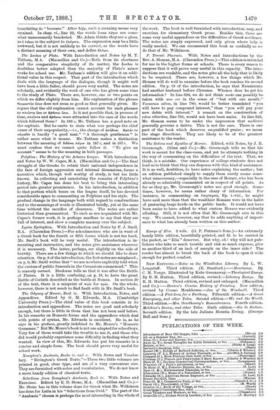The Ladies of Plato. With Introduction and Notes by M.
T. Tatham, M.A. (Macmillan and Co.)—Both from its shortness and the comparative simplicity of its matter, the Lazhes is doubtless better adapted than the majority of Plato's minor works for school use. Mr. Tatham's edition will give it an addi- tional value in this respect. That part of the introduction which deals with the language of the dialogue, though it might well have been a little fuller, should prove very useful. The notes are scholarly, and evidently the work of one who has given some time to the study of Plato. There are, however, one or two points on which we differ slightly from him. His explanation of the phrase Oavuacrrbr 5vor does not seem so good as that generally given. He argues that the old explanation cannot account for such phrases as wAeicrra Scra or tupOorot gaol. Is it not possible that, in process of time, witt7o.ra and 649ovot were attracted into the case of the words which followed them ? In 186 c, Mr. Tatham has a good note on the sophists. But he omits to state what was perhaps the chief cause of their unpopularity,—i.e., the ellsrge of fia‘Bega. KaAdv TE siyaBor is hardly "a good man." "A thorough gentleman" is rather more what it means. Mr. Tatham makes a distinction between the meaning of 6166rcu 1.67or in 187 c, and in 187 e. We must confess that we cannot quite follow it. "To give an account" seems to be the meaning in both passages.






































 Previous page
Previous page